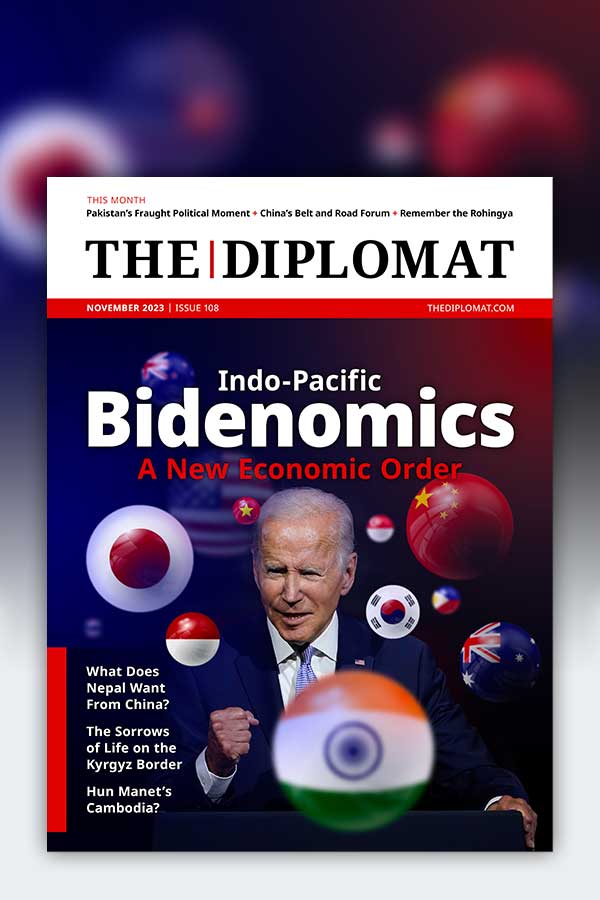| Welcome to the latest issue of Diplomat Brief. This week our top story explores the extent (and limits) of China’s control over the lithium industry. We also have an interview with Agnieszka Pikulicka-Wilczewska, author of “Nowy Uzbekistan,” on what’s changed in Uzbekistan since Shavkat Mirziyoyev took power. |
| Story of the week | ![[object Object]](https://thediplomat.com/diplomat-brief/2023/vol45/images/feature.jpg) | Economy Where China’s Lithium Monopoly Comes FromWhat Happened: Lithium is one of the crucial raw materials needed for the global energy transition. It’s a key ingredient in electric vehicle batteries, for one. Surging demand has led to multiplying lithium companies and a plethora of new mining projects. Lurking behind these efforts are concerns about China’s near-monopoly on the lithium industry. Unfortunately, current policy is targeting the wrong part of the supply chain. Our Focus: “There is plenty of lithium out there and innumerable people willing to mine it; in the raw material sense there is no issue,” Tim Worstall, a senior fellow at the Adam Smith Institute in London and a global expert on rare earths and other minerals, writes for The Diplomat. “But the processing capability is terribly concentrated and nationally so.” Lithium processing, rather than mining, is where China’s dominance comes in. China owns most of the world’s lithium processing plants, and those plants have contracts monopolizing supply from most of the world’s mines. What Comes Next: If Washington and other governments are concerned about China’s control of the lithium industry, “a major and non-China-based processing plant, even a series of them, might be one of those things tax money could be usefully spent upon,” Worstall notes. “Instead, current investment looks more intent on boosting the wrong side of the equation: the supply of raw materials.” As it stands, even new mines in Australia or the United States would be reliant on Chinese companies for processing, only furthering China’s grip over the supply chain. Read this story |
| Behind the News | INTERVIEW Agnieszka Pikulicka-WilczewskaJournalist Agnieszka Pikulicka-Wilczewska, author of “Nowy Uzbekistan,” on the role of the internet: “What is new about ‘New Uzbekistan,’ in my opinion, are the societal changes brought by a freer internet. During the Karimov times, access to the internet and especially social media in Uzbekistan was limited. Mirziyoyev unlocked access to numerous websites, which suddenly gave rise to dozens of new news sites and independent bloggers, which started shaping public opinion.” Read the interview |
| This Week in Asia | Northeast Asia Japan Hosts G-7 Ministerial MeetingTop diplomats from the G-7 members have descended on Japan for the foreign ministers’ meeting. The Israel-Gaza conflict is expected to dominate the agenda; that could prove uncomfortable for Japan, which has been less forward-leaning in its support of Israel than fellow G-7 members. Meanwhile, Tokyo is continuing to advance ties with its partners in sideline bilateral meetings, especially as Japan pursues an ambitious sixth-generation fighter jet project with Italy and the United Kingdom. Find out more | South Asia Heavy Smog Blankets Cities in India, PakistanEvery winter, air pollution hits toxic levels in major cities in both India and Pakistan, including New Delhi, Lahore, Mumbai, and Karachi. The causes are similar: crop burning at the end of the harvest plus seasonal weather patterns that keep the usual emissions from cars and heavy industry from dissipating. Neither the Indian nor the Pakistani government has taken concerted action to address what has become an annual health hazard. Find out more | Southeast Asia Singaporean PM Announces Exit StrategySingapore’s Prime Minister Lee Hsien Loong said this week that he plans to bow out and hand over power to his deputy, Lawrence Wong, after nearly two decades in the country’s top post. Lee, 71, announced that he would step down late next year, before the 2025 general election. He had initially intended to relinquish the post before turning 70, but decided to stay on due to the COVID-19 pandemic. He has served as head of the long-ruling People’s Action Party (PAP), and as prime minister, since 2004. Lee’s retirement from the top post will mark the end of an era in which he and his father, Lee Kuan Yew, have dominated the PAP, and, hence Singaporean politics as a whole. Between them, the Lees have led the country for all but 14 years of its post-independence history. Find out more | Central Asia Putin Heads to KazakhstanOn November 9, Russian President Vladimir Putin is expected to visit Kazakhstan for bilateral meetings with President Kassym-Jomart Tokayev. Putin hasn’t traveled much this year. In March, the International Criminal Court issued an arrest warrant for him and since then Putin has limited his trips to countries he's sure he won’t be detained in: Kyrgyzstan, China, and now Kazakhstan. But while the Russian present has been stuck at home, Kazakhstan has hosted a steady stream of Western leaders as Astana balances its many partners. Find out more |
| Visualizing APAC |  | In 2022, both Kazakhstan’s exports and imports inexplicably jumped by $10 billion – suggesting Kazakhstan imported goods and services worth $10 billion and then rapidly “exported” them somewhere else (likely Russia). See the full picture |
| Word of the Week | Society चौकीदारChowkidar, Hindi for “watchman,” and a favorite self-description of Prime Minister Narendra Modi. Find out more |
|  |
![[object Object]](https://thediplomat.com/diplomat-brief/2023/vol45/images/feature.jpg)

